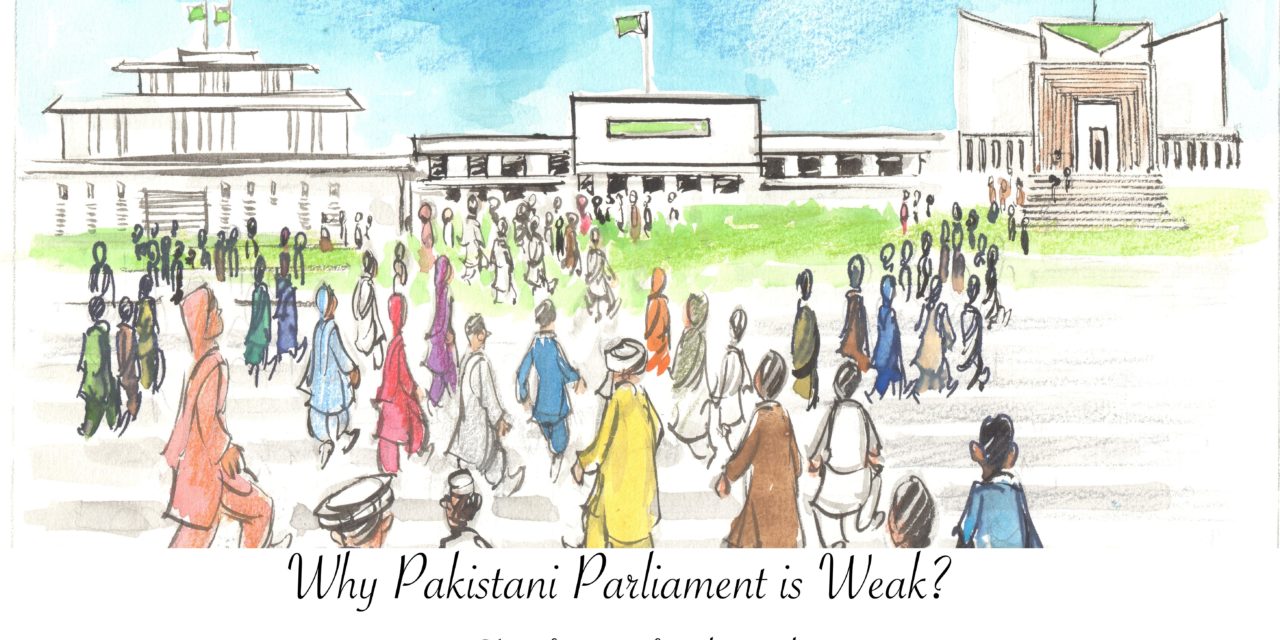Dr. Naazir Mahmood

When you pose this question, you are looking at the flip side of the parliament. Perhaps a better way to start our discussion is to ask ourselves, ‘what makes a parliament strong? If we get an answer to this question we may apply some of them to Pakistan and understand why the parliament in Pakistan is weak.
Let’s make a comparison of the parliaments in China and India. In China, just like in the erstwhile Soviet Union or many other socialist countries, the parliament is there but is considered a rubber stamp. The Communist Party is the supreme authority that is ruled by an authoritarian leader who decides on most policies, and the parliament puts its stamp. In India, there is multiparty democracy but when Indira Gandhi tried to be authoritarian, the people threw her out by a democratic process. But now, even in India the parliament appears to be weak in the face of an increasingly authoritarian rule by Prime Minister Modi.
So the first point is that a parliament can be strong as long as it can withstand a direct or indirect authoritarian onslaught. If authoritarianism in embedded in the system as in China, the parliament will perpetually remain weak. If, a parliament is functioning in a so-called democracy where indirect authoritarian interventions are repeated again and again as in Pakistan, the parliament remains weak. Even in functioning multiparty democracies such as India, at time authoritarian interventions are launched by elected leaders such as Indira Gandhi did or now Modi is doing.
In countries such as Egypt, Nigeria, Pakistan, Thailand and many others, due to direct military interventions parliaments are repeatedly disbanded or dissolved. It is like repeated abortions without allowing the parliamentary fetus to grow. The more abortions of parliament you have, the more likely you are to conceive afresh. So a short-lived gestation period keeps the parliament weak. Each new parliament lacks the maturity it needs to grow strong. Then the military policies tend to counter parliamentary policies and the result is a weak parliament with meaningless proceedings that are hollow.
Now, let’s compare India with the United States and draw some lessons for Pakistan. The strength of parliament to a great extent depends on where the judiciary stands. In the India of the early and mid-1970s and the India of now the parliament became weak because the judiciary became subservient to the authoritarian leader. In the US that does not happen because the democratic traditions are much stronger, still in America at times the judiciary gives verdicts on issues that are not aligned with fundamental and human rights. But it is an ongoing process.
In Pakistan the parliament is weak because the judiciary has seldom, or perhaps never, stood by the parliament. From Justice Munir to Justice Saqib Nisar there is a long line of chief justices who led the judiciary to bow in front of the authority mostly emanating from somewhere else. Though they tried to project that they were doing it in the so-called national interest, the fact remains that in over seven decades the judiciary has repeatedly undermined the parliament, and approved or confirmed anti-democratic steps taken by the ‘competent authority’.
The parliament is weak in Pakistan not only because the judiciary nearly always sided with the real power in this country, but also because the judiciary off and on encroached on parliamentary prerogatives. Especially in the 21st century, one would have expected the judiciary to have matured to the level of not crossing boundaries, but it repeatedly did so. Justice Iftikhar Chaudhary and Justice Saqib Nisar are the two prime examples of this attitude. Both tried to dominate the governance agenda at the cost of a civilian government. They also gave advice to the parliament that was uncalled for and made the parliament even weaker.
After the judicial and military interventions to weaken the parliament, comes the lack of assertiveness in the parliament itself. Somehow the parliament fails to develop its institutional identity. Perhaps the best example of an assertive parliament was demonstrated from 2008 to 2010 when general and usurper President Musharraf was forced to resign in 2008. And then after a broad consultative process the 18th Amendment was passed that so far remains the best Amendment in the past nearly half a century. But then the parliament had to pay the price. There was a strong backlash from both the army and the judiciary.
The so-called memo-gate, and then the judicial disqualification of an elected prime minister, Yusuf Raza Gilani by the Supreme Court led by Justice Iftikhar Chaudhary scuttled the attempt of the parliament to assert it. And that’s where we come to the role of the opposition itself led by Nawaz Sharif who welcomed both the memo-gate case and the removal of another elected prime minister. So, parliament is also weak because the opposition has failed to play its role to strengthen the parliament and has been dancing to the tune of the army or the judiciary.
The parliament in Pakistan is also weak because its prominent committees fail to exercise their authority for various reasons. First, the committee members themselves are not up to the mark in terms of their own competence, honesty, and integrity. Secondly, the bureaucracy—both civilian and military—does not accept the authority of the parliamentary committees, and their disregard results in further weakening of the parliament. These committees are supposed to oversee the executive, but this oversight seldom takes place, and mostly results in humiliation for the parliament itself, when civilian or military bureaucracy gives it a cold shoulder, or even a counterpunch.
Lastly, the parliament in Pakistan is weak because it fails to engage with the public. After elections, most parliamentarians are neither interested in legislative work nor in issues of public concern such as protecting fundamental and human rights, raising voice against the highhandedness of law-enforcement agencies, or preventing enforced disappearance. They become more interested in their own perks and privileges, and the parliament remains weak; but ultimately the parliamentarians themselves are not bothered much, apart from some extraordinary ones such as Afrasiab Khattak, Farhatullah Babar, Mohsin Dawar, Sherry Rehman, and a few more.
[The writer is a columnist and educationist. #NaazirMahmood; mnazir1964@yahoo.co.uk ]


